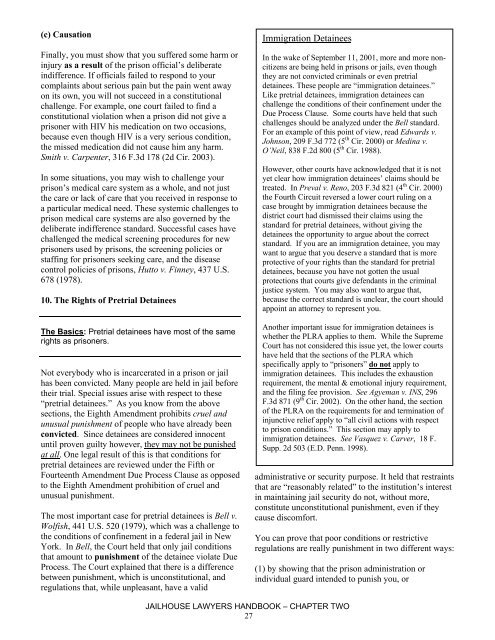Jailhouse Lawyer's Handbook - Sentencing and Justice Reform ...
Jailhouse Lawyer's Handbook - Sentencing and Justice Reform ...
Jailhouse Lawyer's Handbook - Sentencing and Justice Reform ...
Create successful ePaper yourself
Turn your PDF publications into a flip-book with our unique Google optimized e-Paper software.
(c) Causation<br />
Finally, you must show that you suffered some harm or<br />
injury as a result of the prison official’s deliberate<br />
indifference. If officials failed to respond to your<br />
complaints about serious pain but the pain went away<br />
on its own, you will not succeed in a constitutional<br />
challenge. For example, one court failed to find a<br />
constitutional violation when a prison did not give a<br />
prisoner with HIV his medication on two occasions,<br />
because even though HIV is a very serious condition,<br />
the missed medication did not cause him any harm.<br />
Smith v. Carpenter, 316 F.3d 178 (2d Cir. 2003).<br />
In some situations, you may wish to challenge your<br />
prison’s medical care system as a whole, <strong>and</strong> not just<br />
the care or lack of care that you received in response to<br />
a particular medical need. These systemic challenges to<br />
prison medical care systems are also governed by the<br />
deliberate indifference st<strong>and</strong>ard. Successful cases have<br />
challenged the medical screening procedures for new<br />
prisoners used by prisons, the screening policies or<br />
staffing for prisoners seeking care, <strong>and</strong> the disease<br />
control policies of prisons, Hutto v. Finney, 437 U.S.<br />
678 (1978).<br />
10. The Rights of Pretrial Detainees<br />
The Basics: Pretrial detainees have most of the same<br />
rights as prisoners.<br />
Not everybody who is incarcerated in a prison or jail<br />
has been convicted. Many people are held in jail before<br />
their trial. Special issues arise with respect to these<br />
“pretrial detainees.” As you know from the above<br />
sections, the Eighth Amendment prohibits cruel <strong>and</strong><br />
unusual punishment of people who have already been<br />
convicted. Since detainees are considered innocent<br />
until proven guilty however, they may not be punished<br />
at all. One legal result of this is that conditions for<br />
pretrial detainees are reviewed under the Fifth or<br />
Fourteenth Amendment Due Process Clause as opposed<br />
to the Eighth Amendment prohibition of cruel <strong>and</strong><br />
unusual punishment.<br />
The most important case for pretrial detainees is Bell v.<br />
Wolfish, 441 U.S. 520 (1979), which was a challenge to<br />
the conditions of confinement in a federal jail in New<br />
York. In Bell, the Court held that only jail conditions<br />
that amount to punishment of the detainee violate Due<br />
Process. The Court explained that there is a difference<br />
between punishment, which is unconstitutional, <strong>and</strong><br />
regulations that, while unpleasant, have a valid<br />
Immigration Detainees<br />
In the wake of September 11, 2001, more <strong>and</strong> more noncitizens<br />
are being held in prisons or jails, even though<br />
they are not convicted criminals or even pretrial<br />
detainees. These people are “immigration detainees.”<br />
Like pretrial detainees, immigration detainees can<br />
challenge the conditions of their confinement under the<br />
Due Process Clause. Some courts have held that such<br />
challenges should be analyzed under the Bell st<strong>and</strong>ard.<br />
For an example of this point of view, read Edwards v.<br />
Johnson, 209 F.3d 772 (5 th Cir. 2000) or Medina v.<br />
O’Neil, 838 F.2d 800 (5 th Cir. 1988).<br />
However, other courts have acknowledged that it is not<br />
yet clear how immigration detainees’ claims should be<br />
treated. In Preval v. Reno, 203 F.3d 821 (4 th Cir. 2000)<br />
the Fourth Circuit reversed a lower court ruling on a<br />
case brought by immigration detainees because the<br />
district court had dismissed their claims using the<br />
st<strong>and</strong>ard for pretrial detainees, without giving the<br />
detainees the opportunity to argue about the correct<br />
st<strong>and</strong>ard. If you are an immigration detainee, you may<br />
want to argue that you deserve a st<strong>and</strong>ard that is more<br />
protective of your rights than the st<strong>and</strong>ard for pretrial<br />
detainees, because you have not gotten the usual<br />
protections that courts give defendants in the criminal<br />
justice system. You may also want to argue that,<br />
because the correct st<strong>and</strong>ard is unclear, the court should<br />
appoint an attorney to represent you.<br />
Another important issue for immigration detainees is<br />
whether the PLRA applies to them. While the Supreme<br />
Court has not considered this issue yet, the lower courts<br />
have held that the sections of the PLRA which<br />
specifically apply to “prisoners” do not apply to<br />
immigration detainees. This includes the exhaustion<br />
requirement, the mental & emotional injury requirement,<br />
<strong>and</strong> the filing fee provision. See Agyeman v. INS, 296<br />
F.3d 871 (9 th Cir. 2002). On the other h<strong>and</strong>, the section<br />
of the PLRA on the requirements for <strong>and</strong> termination of<br />
injunctive relief apply to “all civil actions with respect<br />
to prison conditions.” This section may apply to<br />
immigration detainees. See Vasquez v. Carver, 18 F.<br />
Supp. 2d 503 (E.D. Penn. 1998).<br />
administrative or security purpose. It held that restraints<br />
that are “reasonably related” to the institution’s interest<br />
in maintaining jail security do not, without more,<br />
constitute unconstitutional punishment, even if they<br />
cause discomfort.<br />
You can prove that poor conditions or restrictive<br />
regulations are really punishment in two different ways:<br />
(1) by showing that the prison administration or<br />
individual guard intended to punish you, or<br />
JAILHOUSE LAWYERS HANDBOOK – CHAPTER TWO<br />
27





